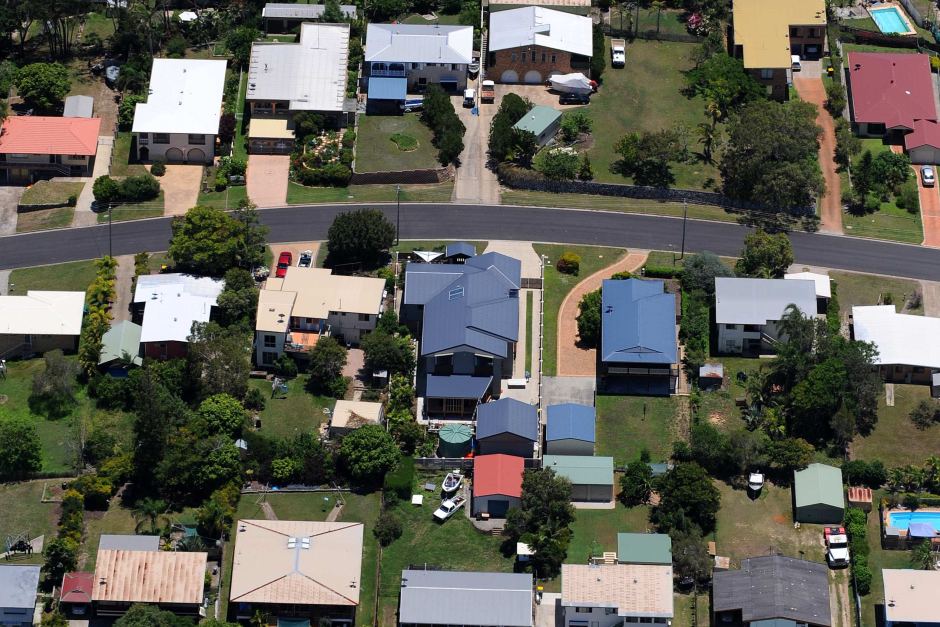Category: Economic Trends / Housing Industry / Banking
Mortgage arrears break records in two states and NT
Wednesday, 19 Oct 2016 12:30:59 | Michael Janda

Residential housing in Gladstone in central Queensland (AAP Image: Dave Hunt - file photo)
Mortgage arrears nationally have risen to three-year highs - with Western Australia, Tasmania and the NT at record levels - despite interest rates falling to historic lows.
Key points:
- Moody's says 1.5pc of mortgages now 30+ days behind in repayments
- WA has highest arrears rate of 2.33pc
- Moody's predicts further "moderate" rise in arrears ahead
The figures from ratings agency Moody's put the national rate of delinquent mortgages - those at least 30 days behind on repayments - at 1.5 per cent, up 0.16 per cent over the past year to May 31.
Despite a 1 percentage point reduction in the official cash rate over the past three years, mortgage delinquencies are almost back to the 1.59 per cent recorded in April 2013.
Furthermore, mortgage delinquencies increased over the past year in every state and territory, even those with relatively strong economies such as New South Wales and Victoria.
However, the situation was far worse in weaker areas, with Western Australia, Tasmania and the Northern Territory all recording record levels of mortgage arrears in figures that go back to 2005 - before the global financial crisis and the pre-crisis peak in the RBA's cash rate of 7.25 per cent.
South Australian mortgage delinquencies were also just 0.01 percentage point below their record high reached in 2013.
Western Australia's mortgage delinquency rate was by far the worst at 2.33 per cent, up nearly 0.7 per cent since last year.
Moody's blamed falling house prices (which often prevent people simply selling to avoid mortgage delinquency), higher unemployment and underemployment than the national average, and a 1.6 per cent fall in average weekly wages over the past year for the state's mortgage woes.
"Western Australia's final demand — a measure of domestic economic growth that excludes exports — fell by a sharp 4.6 per cent during fiscal year 2015/2016 owing to significant declines in business investment and weak household consumption," the report observed.
Mortgage arrears to keep rising 'moderately'
Moody's is forecasting that the rate of people in trouble on their housing debt will keep rising "moderately" for the rest of the year.
"Lower commodity prices and the associated slowdown in mining and mining-related sectors will continue to weigh on GDP growth and therefore mortgage performance," the ratings agency noted.
"We also expect that underemployment — particularly in Western Australia — will persist, and the slowing pace of home price growth to continue, constraining mortgage performance for the remainder of 2016."
The ratings agency emphasised the importance of underemployment to the rise in mortgage delinquencies, even though unemployment has been easing.
Moody's noted that Western Australia's underemployment rate has surged around 3 percentage points over the past three years to almost 9.5 per cent.
Meanwhile, underemployment in New South Wales, where delinquencies remain reasonably low, stayed quite steady at 7.8 per cent.
"Underemployment results in lower income and reduced capacity to make mortgage repayments, increasing in turn the risk of
delinquencies and defaults," Moody's explained.
The ratings agency is also concerned that a 31 per cent rise in national average home prices over the past three years - led by Sydney and Melbourne - has skipped ahead of a weak 5 per cent rise in average weekly earnings, meaning debt levels have soared.
"Higher debt levels make households more vulnerable to economic or housing market shocks, and make meeting mortgage repayments more difficult, increasing in turn the risk of delinquencies and defaults," Moody's cautioned.
However, the rise in home prices has also given many owners more equity in their properties as a buffer against economic and housing market volatility.
Moody's also noted that continued low interest rates and the weaker Australian dollar promoting growth in export-oriented services such as tourism and education should help limit the rise in mortgage arrears and defaults.
- About Us
- |
- Terms of Use
- |
-
 RSS
RSS - |
- Privacy Policy
- |
- Contact Us
- |
- Shanghai Call Center: 962288
- |
- Tip-off hotline: 52920043
- 沪ICP证:沪ICP备05050403号-1
- |
- 互联网新闻信息服务许可证:31120180004
- |
- 网络视听许可证:0909346
- |
- 广播电视节目制作许可证:沪字第354号
- |
- 增值电信业务经营许可证:沪B2-20120012
Copyright © 1999- Shanghai Daily. All rights reserved.Preferably viewed with Internet Explorer 8 or newer browsers.




 Send to Kindle
Send to Kindle

